Calf muscle pain can be due to injury, underlying medical condition or a problem in the nerves or arteries in the lower leg.
Whilst often something minor like a grade one strain, the problem may not actually be in the muscle itself and could be indicative of a serious problem such as a DVT so should always be treated with caution.
Here we will look at the most common causes of calf pain, how the symptoms vary and how to spot a potentially serious problem.
Quick Anatomy Lesson
The calf is the area on the back of the leg between the knee and the ankle. It is made up of two muscles collectively known as the triceps surae. Triceps surae simply means “three-headed calf (muscle)”. It comprises of a pair of muscles, gastrocnemius and soleus.
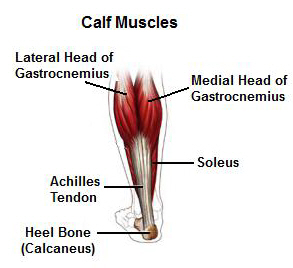
The gastrocnemius muscle has two-heads which arise from either side of the bottom of the femur just above the knee joint. It is a superficial muscle, meaning it forms the top layer, just below the skin.
The soleus muscle runs deep (underneath) to gastrocnemius and arises from the top of the tibia, just below the knee joint. The two muscles join together around mid-calf level to form the Achilles tendon which attaches the calf muscles to the back of the heel.
The triceps surae muscles work together to plantarflex the foot i.e. pull the foot downwards and stabilise the ankle. They are particularly important in controlling and executing the push-off phase of walking and running.
Common Causes of Calf Muscle Pain
Calf muscle pain can come on gradually over time or may come on suddenly. Here we will look at the eight most common causes of calf pain.
1) Calf Injury
If the calf muscles are suddenly overstretched, some or all of the fibres may be torn known as a calf strain or rupture. This is the most common cause of calf muscle pain. It commonly happens during sports such as basketball, tennis and running where the person suddenly pushes off from a stationary position or has to change direction quickly.
There are 3 grades of calf muscle strain, depending on the severity of the injury, which can take anywhere from a few days to months to recover from. To find out more about symptoms and treatment, visit the calf strain section.
2) Calf Cramps
Commonly referred to as a Charley Horse in North America, these are when involuntary spasms occur in the lower leg causing calf pain. They are often caused by overuse, fatigue, diet, dehydration and muscle imbalance.
To find out more about how cramp presents and top tips on how to treat it, visit the calf and foot cramps section in our sister site.
3) DVT
A deep vein thrombosis is a very serious cause of calf pain. It is the formation of a blood clot in a deep vein, usually in the leg. A DVT requires IMMEDIATE medical attention as it reduces the blood flow to the foot, and there is the risk that the blood clot will break off and travel through the bloodstream to the heart or lungs which can cause a heart attack or pulmonary embolus.
The common signs of a DVT are pain, redness, warmth and swelling in the calf region, and the pain often gets worse if your dorsiflex your foot (pull your toes up towards you). DVT’s are often associated with surgery or periods of inactivity e.g. plane journeys.
4) Achilles Tendonitis
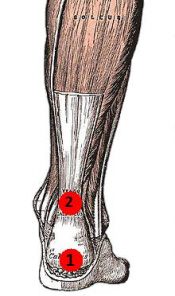
Inflammation or degeneration of the Achilles tendon commonly causes calf muscle pain. The Achilles Tendon is approximately 6inches long, connecting the calf to the heel. The Achilles is extremely strong but not very flexible, making it prone to damage, especially if the calf muscles are weak and tight.
Achilles Tendonitis can take months to recover from. Find out more about the condition including treatment options in the Achilles Tendonitis section on our sister site.
5) Muscle Imbalace
Calf muscle weakness and tightness is a common cause of calf muscle pain. The weak muscles will often tire quickly if you are on your feet for prolonged periods of time and if the calf is tight, it is prone to damage from overstretching.
You can find a whole range of calf strengthening and calf stretching exercises to help combat this common cause of calf muscle pain.
6) Bakers Cyst
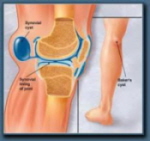
A Bakers Cyst is inflammation of the bursa (fluid filled sac) that sits behind the knee joint. It can cause calf pain, particularly if the cyst bursts resulting in the fluid tracking down the leg into the triceps surae.
Bakers Cysts are commonly associated with arthritis, but can occur for other reasons. Visit the Bakers Cyst section to find out more including causes, symptoms and treatment options.
7) Trapped Nerve
Compression of nerves of the lower leg can cause pain in calf, pins and needles and numbness in the calf region. The compression may be coming from the lower back where the nerve originates from, or at any point along the nerve. Any symptoms of nerve compression should be checked out by your doctor.
8) Peripheral Vascular Disease (PVD)
Also known as peripheral artery disease, this is when there is a narrowing in the arteries which slows blood flow. It is commonly associated with smoking, diabetes, high cholesterol levels and high blood pressure. In severe cases, the foot and lower leg may change colour – this warrants immediate medical attention.
To find out more about these common causes of calf muscle pain, including symptoms, diagnosis and treatment options, choose from the links above.
Safety Advice
Episodes of calf muscle pain should always be assessed by your doctor to ensure it is nothing serious such as a DVT which requires immediate attention. Pay particular attention to the signs for a DVT, redness, swelling, warmth and pain around the calf.
Also, calf pain that is worse at night or makes it difficult to walk warrants immediate medical attention.
Source: http://www.knee-pain-explained.com/calf-muscle-pain.html


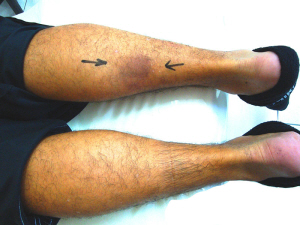
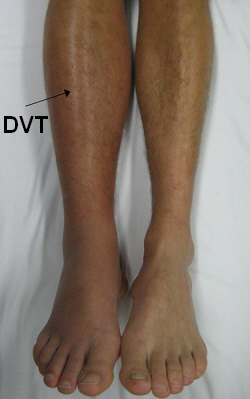
No comments:
Post a Comment